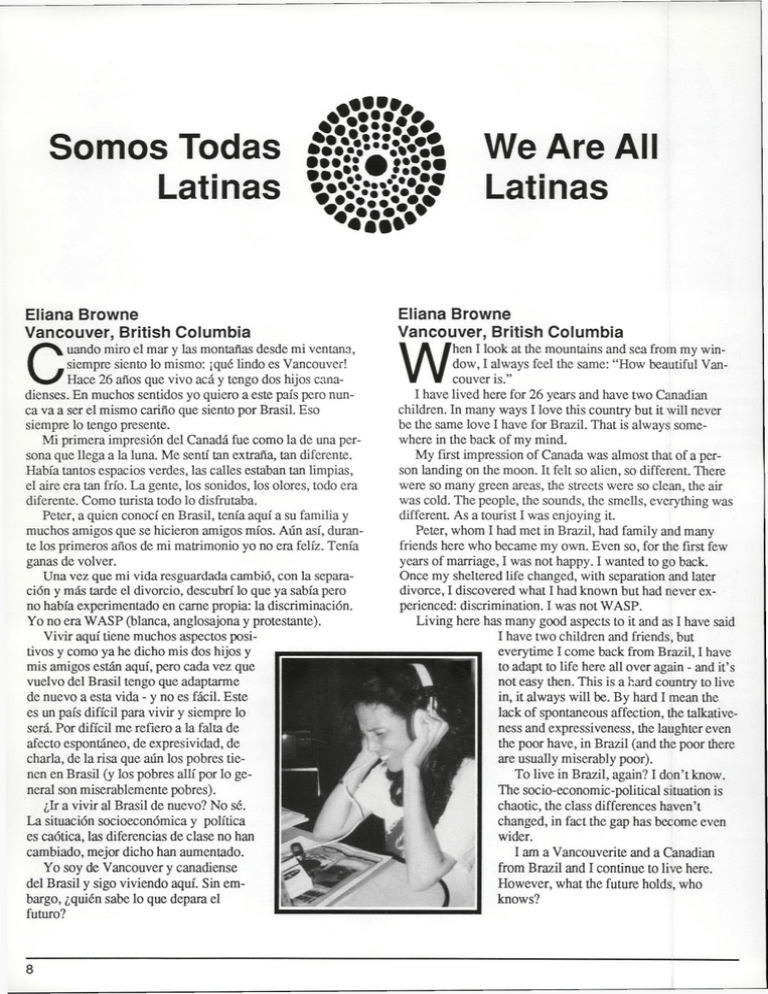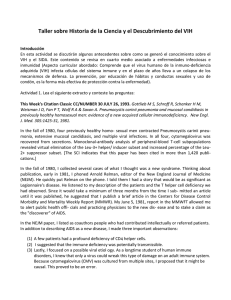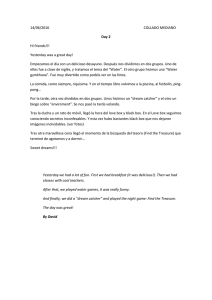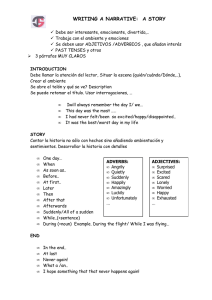Somos Todas We Are All Latinas Latinas
Anuncio

Somos Todas Latinas We Are All Latinas Eliana Browne Vancouver, British Columbia Eliana Browne Vancouver, British Columbia uando miro el mar y las montañas desde mi ventana, siempre siento lo mismo: ¡qué lindo es Vancouver! Hace 26 años que vivo acá y tengo dos hijos canadienses. En muchos sentidos yo quiero a este país pero nunca va a ser el mismo cariño que siento por Brasil. Eso siempre lo tengo presente. Mi primera impresión del Canadá fue como la de una persona que llega a la luna. Me sentí tan extraña, tan diferente. Había tantos espacios verdes, las calles estaban tan limpias, el aire era tan frío. La gente, los sonidos, los olores, todo era diferente. Como turista todo lo disfrutaba. Peter, a quien conocí en Brasil, tenía aquí a su familia y muchos amigos que se hicieron amigos míos. Aún así, durante los primeros años de mi matrimonio yo no era feliz. Tenía ganas de volver. Una vez que mi vida resguardada cambió, con la separación y más tarde el divorcio, descubrí lo que ya sabía pero no había experimentado en carne propia: la discriminación. Yo no era WASP (blanca, anglosajona y protestante). Vivir aquí tiene muchos aspectos positivos y como ya he dicho mis dos hijos y mis amigos están aquí, pero cada vez que vuelvo del Brasil tengo que adaptarme de nuevo a esta vida - y no es fácil. Este es un país difícil para vivir y siempre lo será. Por difícil me refiero a la falta de afecto espontáneo, de expresividad, de charla, de la risa que aún los pobres tienen en Brasil (y los pobres allí por lo general son miserablemente pobres). hen I look at the mountains and sea from my window, I always feel the same: "How beautiful Vancouver is." I have lived here for 26 years and have two Canadian children. In many ways I love this country but it will never be the same love I have for Brazil. That is always somewhere in the back of my mind. My first impression of Canada was almost that of a person landing on the moon. It felt so alien, so different. There were so many green areas, the streets were so clean, the air was cold. The people, the sounds, the smells, everything was different. As a tourist I was enjoying it. Peter, whom I had met in Brazil, had family and many friends here who became my own. Even so, for the first few years of marriage, I was not happy. I wanted to go back. Once my sheltered life changed, with separation and later divorce, I discovered what I had known but had never experienced: discrimination. I was not WASP. Living here has many good aspects to it and as I have said I have two children and friends, but every time I come back from Brazil, I have to adapt to life here all over again - and it's not easy then. This is a hard country to live in, it always will be. By hard I mean the lack of spontaneous affection, the talkativeness and expressiveness, the laughter even the poor have, in Brazil (and the poor there are usually miserably poor). To live in Brazil, again? I don't know. The socio-economic-political situation is chaotic, the class differences haven't changed, in fact the gap has become even wider. I am a Vancouverite and a Canadian from Brazil and I continue to live here. However, what the future holds, who knows? C ¿Ir a vivir al Brasil de nuevo? No sé. La situación socioeconómica y política es caótica, las diferencias de clase no han cambiado, mejor dicho han aumentado. Yo soy de Vancouver y canadiense del Brasil y sigo viviendo aquí. Sin embargo, ¿quién sabe lo que depara el futuro? 8 W Catalina Policzer Vancouver, British Columbia M e llamo Catalina Policzer. Nací el 26 de abril de 1969 en Santiago, Chile. Yo vivía en una casita azul con un patio grande donde había otra casa más chica de dos piezas para mi abuelo. Cuando tenía cuatro años las cosas empezaron a verse mal en Chile. Un hombre había matado al Presidente y se había tomado Chile. Lo único que me acuerdo es que mi papá desapareció sin ninguna razón y que volvió un año después. Después me acuerdo de mi mamá arreglando todo cuando estábamos listos para irnos. ¡El bolso con mi ropa era más grande que yo! Mi clase me hizo una fiesta de despedida, nunca me voy a olvidar. Yo les di una maceta de no-me-olvides. Cuando salimos para el aeropuerto nos siguió nuestro perro. El aeropuerto estaba a muchas millas y cuando mi perro volvió a casa se enfermó y al poco tiempo murió. Cuando llegué a Vancouver todo pasó tan rápido que no me acuerdo de nada. Al principio no tuve mucho que hacer hasta que conocí a algunos amigos. Bueno, entonces, eso nos trae hasta ahora. Yo estoy contenta aquí en la escuela Emily Carr. Esa es la historia de mi vida. Catalina Policzer Vancouver, British Columbia | y name is Catalina Policzer. I was born on April 26, 1969 in Santiago, Chile. I lived in a small blue I house with a large back yard that had a smaller tworoom house for my grandfather. When I was four years old, things started to look bad in Chile. A man had killed the president and taken over Chile. The only thing I remember is having my father disappeared with no reason at all and come back a year later. I then remember seeing my mom arranging everything when we were ready to leave. My bag with my clothes was bigger than me! My class gave me a farewell party, I'll never forget that. I gave them a pot of forgetme-nots. When we left, our dog followed us. The airport was many miles away and when my dog came back home he was ill and died a little while later. When I got to Vancouver everything happened so fast I don't remember a thing. I didn't have much to do at first until I made a few friends. Well, I guess that brings it to now. I am happy to be here in Emily Carr School. That is the story of my life. M (Escrito en 1979 para un proyecto escolar). *Written in 1979for a school project. Susy Méndez Toronto, Ontario M i nombre es Susy. Soy de Guatemala. Yo vine por primera vez a Canadá en 1973 por un año. Como estudiante viajé mucho por Centro y Norte América. Canadá fue el país que más me gustó. Me casé en 1980 en mi país y tuvimos 2 hijos. Mi esposo se vino en 1984, le gustó también y nos quedamos. Estábamos bien en Guatemala pero mi entusiasmo por el Canadá contagió a mi esposo. Mi sueño se cumplió. El 31 de julio de 1989 empecé a trabajar en una fábrica, pero quiero trabajar como secretaria, mi profesión. Mi inglés no es bueno. Yo pedí el curso de inglés al gobierno, y me lo negaron, diciendo que mi esposo ganaba plata y que yo no necesitaba trabajar; quizás más tarde me lo darían. Han pasado los años y he perdido el interés en pedirlo de nuevo. Si tuviera la oportunidad de estudiar sin dejar de tener un sueldo, lo haría; de lo contrario, no se puede. La vida es cara. Por último quiero decir que la mujer que viene a este país, tiene que cambiar. El hombre y la mujer deben compartir las responsabilidades de la casa. Mi matrimonio ha mejorado aquí. Somos más unidos. Susy Méndez Toronto, Ontario M y name is Susy. I'm from Guatemala. I came to Canada for the first time in 1973 for a year. As a student I traveled a lot through Central and North America. Canada was the country I liked the best. I married in 1980 in my country and had 2 children. My husband came in 1984, liked it and we stayed here. We were doing fine in Guatemla but my enthusiasm for Canada caught my husband. My dream came true. On July 31,1989 I began working in a factory, but I want to work in my profession, as a secretary. My English is not good. I asked the government for English training but they turned me down saying that my husband was earning money and that I didn't need to work, I could maybe be accepted into the program later. Years have gone by and I have lost interest in asking for it again. If I had the chance of studying while still earning a living, I would do it, otherwise it can't be done. The cost of living is too high. Finally I'd like to say that women who come to this country have to change. Men and women have to share the responsibilities of the house. My marriage has improved here. We are closer. María Margarita Jiménes Halifax, Nova Scotia María Margarita Jiménes Halifax, Nova Scotia I e llamo María Margarita Jiménes de Roberts. Nací el 13 de mayo de 1951 en Holguín, Cuba. Mi padre, 1 de nacionalidad dominicana, estaba en ese entonces exilado a causa de Trujillo. En el verano de 1958, nos trasladamos a Venezuela donde mi padre consiguió un trabajo como profesor. A la caída de la dictadura de Trujillo en 1961, conocimos finalmente la República Dominicana. En 1964 fui a estudiar a París. Allí permanecí nueve años como estudiante de bachillerato, obteniendo mi maestría en la enseñanza de español en la Sorbona. De regreso a la República Dominicana trabajé como profesora universitaria hasta 1977, fecha en que obtuve una beca para sacar una Maestría en Comunicaciones en Nueva York. En 1978 regresé a Santo Domingo y trabajé durante 10 años como encargada del Departamento Audio Visual del Centro Dominicano de Estudios de la Educación (CEDEE), institución de educación popular. En marzo de 1980 me casé con un ciudadano canadiense, Angus Roberts, que conocí a través de mi trabajo. Tenemos 2 hijos. El creciente deterioro de mi país nos llevó a optar por trasladamos a Canadá en el verano de 1988. Hace un año que trabajo como profesora en el Departamento de Español de Dalhousie. De mi país echo fundamentalmente de menos a mi familia. En este período de mi vida no añoro a mi país, ya que el deterioro de la calidad de vida y la corrupción generalizada que caracteriza los períodos de crisis económica conforman una situación en la que nos era muy difícil vivir. y name is María Margarita Jiménes de Roberts. I was born on May 13,1951, in Holguín, Cuba. My father, from the Dominican Republic, was an exile from Trujillo's regime. We moved to Venezuela the summer of 1958 where my father got a job as a professor. When the Trujillo dictatorship fell in 1961 we finally got to know the Dominican Republic. In 19641 went to Paris to study. I stayed there nine years where after having completed highschool, I obtained a degree in Spanish from the Sorbonne. On my return to the Dominican Republic I worked as a university professor until 1977 when I got a scholarship to pursue a Master's Degree in Media Studies in New York. I returned to Santo Domingo in 1978 and worked for 10 years in charge of the Audio Visual Department of the Dominican Republic Centre for Studies in Education (CEDEE), an institution for popular education. In March of 19801 married a Canadian, Angus Roberts, whom I had met through work. We have 2 children. The increasing deterioration of my country led us to make the decision to move to Canada in the summer of 1988. I've been working as a lecturer in the Spanish Department of Dalhousie for over a year. What I miss the most from my country is my family. In this period of my life I don't long for my country because the deterioration in the quality of life and generalized corruption which characterizes periods of economic crisis amounted to a situation in which it was very hard to live. Amparo Vargas Calgary, Alberta Amparo Vargas Calgary, Alberta I i nombre es Amparo Vargas, tengo 30 años y soy divorciada con dos hijas. Llegué a Canadá desde NicaI ragua, el 7 de septiembre de 1988. Desde mi llegada he tenido ayuda de parte del gobierno para continuar mis estudios. Mis planes para el futuro son aprender el idioma para poder así seguir una carrera técnica y obtener un trabajo que me permita mantener a mis hijas. En Calgary estoy integrada a la Organización de Mujeres Inmigrantes y al Congreso Hispano Canadiense. Ambos tienen programas excelentes para los inmigrantes, los cuales son de gran ayuda para los recién llegados a este país. Creo que nuestra vida en Canadá cambia en relación a nuestro país de origen y debemos como inmigrantes hispanos ayudamos mutuamente para integramos en esta sociedad sin perder nuestra identidad. \t y name is Amparo Vargas, I am thirty years old and I am divorced; I have two daughters. I arrived in Canada from Nicaragua on September 7,1988. Since my arrival I have had government assistance to continue my studies. My plans for the future include learning the language so that I can enroll in a technical career and get a job that will allow me to support my daughters. In Calgary I am part of two organizations: the Immigrant Women's Group and the Hispanic-Canadian Congress. Both of them have excellent programs for immigrants, which are very helpful to those who have recently arrived in the country. I think that our life in Canada is very different from our life in our country of origin and that as hispanic immigrants we must help each other in our process of integration to this society, without losing our identity. ^ ^ M M 10 M M


